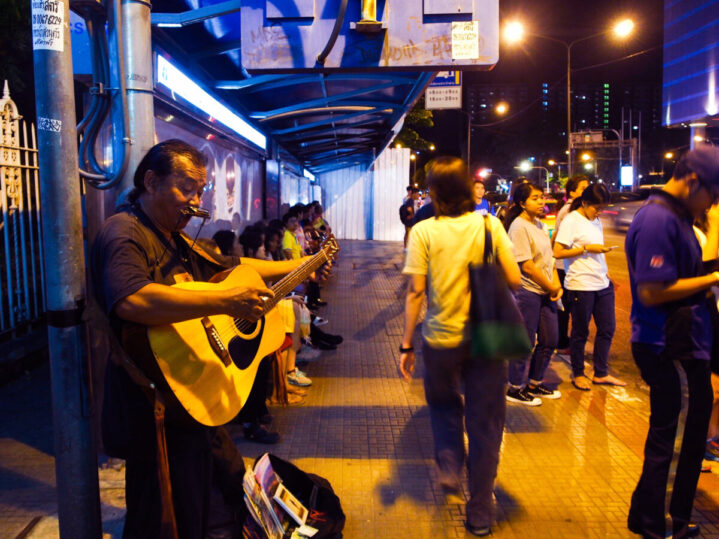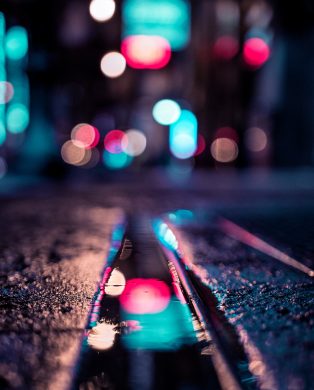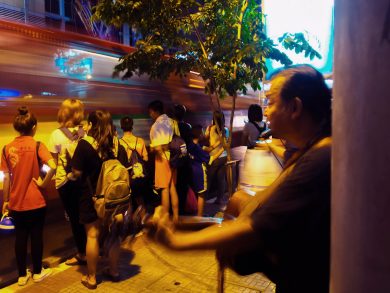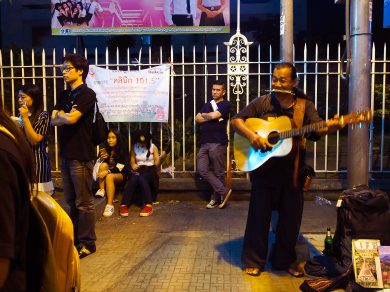
Phu Chai – the music amidst Bangkok’s traffic noise
Being eight minutes late than I normally was to the bus stop wasn’t an ideal situation for me. Eight minutes in Bangkok meant two more hours of being stuck in rush hour traffic. As I waited with a big frown forming on my face, music flowed through the air behind me and into my ears. Almost instantly, I felt a certain vibe of calmness, which had reversed my growing scowl and turned it into an internal smile. It was the music of Pu Chai na Pattalung. As he finished a song, he picked up his harmonica to continue with another one. “Our country Thailand is a beautiful place. We have everything and also cobras in our toilets; No one else has that,” he sung. By this time, those who have given him their loose change may have just stayed to enjoy his music, rather than catch a cab – which by the way, would still be stuck at a stagnant red light.
I felt like it was only right, that I spoke to him and ask about his story. Afraid that he might have been lost in his own music, I signalled him with a wave and asked if we could talk. I told him I would be back by the next day, and he simply smiled and told me he’d be there. And there he was the next day, in the same spot, a guitar in his hands and a harmonica on his lips. The moment we made eye contact, he gave me the same smile but continued playing his music.
I approached him again, this time, hinting my need for conversation. He stopped playing his music and greeted me keenly. Just before we started, he said, “Hold on,” and took a swig from the bottle of beer beside him on the paved footpath, as if to prepare for my long set of questions. The former freelance teacher began player music during the Thai era of rebels, a period of anti-government protests and searching for the meaning of life. This was during the time of the civil uprising in Thailand when the spread of communism came by and numerous university students were killed as a result of fighting for democracy. ‘Songs for life’, or pleng puer cheewit in Thai, grew more common as people started questioning the reason for why they go work in offices and get paid in cheques. “Back then, we would protest against the Japanese by refusing to conform to their culture and influence.
“Back then, we would protest against the Japanese by refusing to conform to their culture and influence.
That is unlike the present, where perhaps you would protest against the Americans, right before you enter KFC,” Pu Chai said. Pu Chai originally started as a pianist, mentions Shakopsky’s classic music. But when asked if that was his artistic inspiration, he replied that it was mostly a good family background, environment, and his eagerness to learn. “My family is actually in Illinois right now. We came out of hiding in the forest in 1989, after collecting mushrooms for a really long time,” he said. He then emigrated to the United States, to return to his homeland after almost a decade to start his music career with a desire to create conceptual art.
“Music is like a journey of thoughts, but kids these days ruin it. When we make music, we have to read newspapers to know what to sing about – whether corruption, sex slavery, or freedom. Now it’s just *strums guitar* “oh you know how much I love you…” all the time,” Phu Chai sang in a tune. “To write about the beach, you have to sleep at the beach. To write about whores, you have to sleep with whores,” he shares his wisdom. “Don’t do philosophy – you’ll become mad,” he advised. He graduated with a PhD in Philosophy from Illinois Southern University. He had lived to the US for almost 10 years, before circling the globe and bringing his music along to share with others. Now, he is part of a group called Gypset, which consists of over 3,000 people from countless countries that wander around without thoughts on settling down. His plan for next year is to get a motorbike and ride through the US, and “find a good place to die”. He also claims to own a resort in Pai, where he is currently based, and offers art therapy to visitors. Admittedly, that is not something you would expect from a street musician.
“Once, I returned from France at around 3am in the morning and stood at the bus stop to adjust my watch. A freshman walked by, touched me by the shoulder, handed me 20B and told me, ‘Keep fighting, pal.’ Well, thank you sir,” Pu Chai said. “People don’t know I was in Chiang Mai yesterday and flew in from Krabi this morning. They don’t know what I do, but when they see me by the street, they look down on me. They don’t listen to the lyrics when I play ‘Where have all the flowers gone’. They know McDonald’s and their French fries, but they don’t understand my lyrics.” This shows a part of Thailand that is overlooked by many, the subtle racism that is always invisible, yet always present. “We Thais classify without realising. You will never hear an Isaan student in Chulalongkorn speak Isaan because they are ashamed. When you go to 7/11, you belittle the employees. Our society is that way, and that’s why the new generation is so weak. If I buy just a soda, they’d give me looks; but if I get a big brunch set, they’d treat me well. If a farang gets a beer, that’s fine; but if I do the same, I’d be judged,” Pu Chai explains. “Sometimes people walk by, and they’d say, ‘Don’t give him change, he’ll use it to go buy beer.’ Then I’d think to myself, ‘I prefer Jack Daniel’s’.” Another issue that the singer addresses about Thai society is our tendency to follow trends.
If a farang gets a beer, that’s fine; but if I do the same, I’d be judged,” Pu Chai explains. “Sometimes people walk by, and they’d say, ‘Don’t give him change, he’ll use it to go buy beer.’ Then I’d think to myself, ‘I prefer Jack Daniel’s’.” Another issue that the singer addresses about Thai society is our tendency to follow trends.
“We actually already know who we are and why we do what we do, but why does it have to be determined for us what we become and how we dress?” Pu Chai puts up a question. “In the present, it is a load of fashion and a lack of self-discovery. When Eat Am Are was popular, everyone lined up to eat there. I once asked why it was so. Well, just because.”In the crowd of Bangkokians waiting for the bus – half, eyes glued to the traffic and the other half, eyes on their phones – the nomadic musician stood out like a black sheep. Besides the way he looked and the clothes he wore, the sound of his voice and the rhythm of his guitar rose above the constant noise of the motorcycle brakes and car horns.
As if he had been waiting his entire life to talk about it, he continued, “Why do you need to go to school? Some women just graduate, get married, have kids, and get a body repair so their husbands will still love them. That’s all to life. You make money and you’re scared of death. Have you ever seen snow? Have you seen the beautiful dewdrops at Phu Gradueng? Have you seen all of Thailand? Have you seen the bright spirit of the market in the morning? Is there anything you’ve seen at all? Their lives are just drowned – getting cheques, going to the mall, eating luxurious meals, and buying expensive cars is one kind of happiness, or having children, growing old, and having visits from your grandchildren. But there is no discovery.”
“Everyone does things for their own happiness. I sing to make me happy. When I sing, it brings me to the days I scooped snow for six dollars, to the rice paddies in the countryside, and to my place in Bangkok. It makes me miss it.” He then adds, “We are lost in the manmade happiness that has created a society with made-up traditions that make up a culture. Because of that, we forget to teach the new ones to explore the outside world.”
Just as I was about to ask him about his thoughts on the Thai education system, it seemed as if he had read my mind, because he then began, “Standing by the street, I see these people yelling out, ‘Three route 36 buses are here.’ Don’t you think other people see that already? ‘It’s raining. Be careful, the road is slippery,’ they like to say. This is why Thai people can be dumb. There are signs, but no one reads them. This is the stupidity of our education system. Your do-good actions have bad effects. With the information desk, all these people ask how to go to the noodle shop or the photocopy machine. They don’t find out by themselves or even think for themselves. We need to change the education system. My goal in life is to burn down the Education Ministry, but I’m scared they’ll rebuild it. The world has much to offer, but no one learns about it. We have teachers that don’t teach, but teach you how to memorise. ” Despite all the flaws he has listed about Thailand, Pu Chai still believes his country is a wonderful home.
“Even when the economy is bad, I owe it to the public. If they have little, they give little and when they have more, they give more. It shows me that Thailand is actually a lovely place with lovely people.
It’s just a shame that a bad society can make a human evil, while a good society can make the evil human,” he said.



